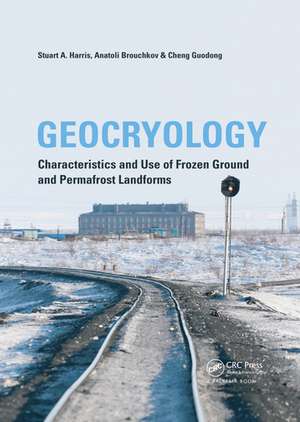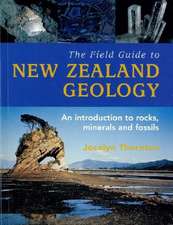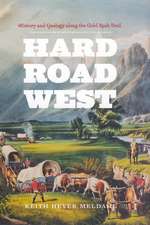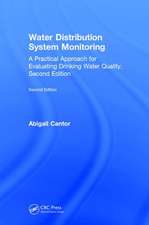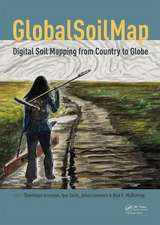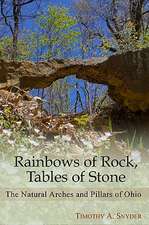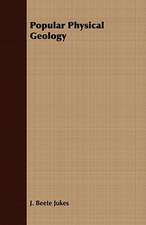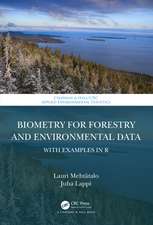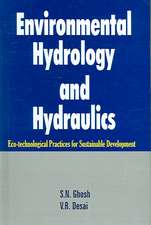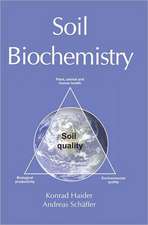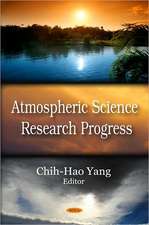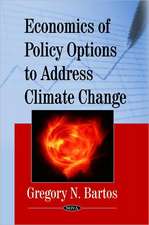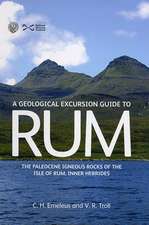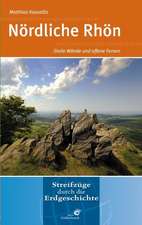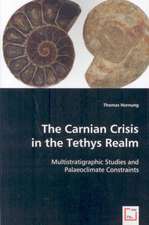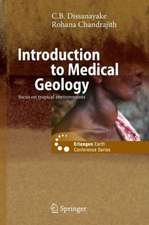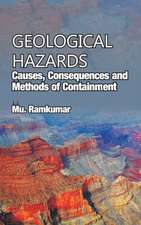Geocryology: Characteristics and Use of Frozen Ground and Permafrost Landforms
Autor Stuart A. Harris, Anatoli Brouchkov, Cheng Guodongen Limba Engleză Paperback – 31 iul 2020
The book is divided into three parts. Part 1 provides an introduction to the characteristics of permafrost. Four chapters deal with its definition and characteristics, the unique processes operating there, the factors affecting it, and its general distribution. Part 2 consists of seven chapters describing the characteristic landforms unique to these areas and the processes involved in their formation. Part 3 discusses the special problems encountered by engineers in construction projects including settlements, roads and railways, the oil and gas industry, mining, and the agricultural and forest industries.
The three authors represent three countries and three language groups, and together have over 120 years of experience of working in permafrost areas throughout the world. The book contains over 300 illustrations and photographs, and includes an extensive bibliography in order to introduce the interested reader to the large current literature.
Finalist of the 2019 PROSE Awards.
| Toate formatele și edițiile | Preț | Express |
|---|---|---|
| Paperback (1) | 490.51 lei 6-8 săpt. | |
| CRC Press – 31 iul 2020 | 490.51 lei 6-8 săpt. | |
| Hardback (1) | 1260.88 lei 6-8 săpt. | |
| CRC Press – 28 sep 2017 | 1260.88 lei 6-8 săpt. |
Preț: 490.51 lei
Preț vechi: 683.47 lei
-28% Nou
Puncte Express: 736
Preț estimativ în valută:
93.85€ • 98.52$ • 77.90£
93.85€ • 98.52$ • 77.90£
Carte tipărită la comandă
Livrare economică 10-24 aprilie
Preluare comenzi: 021 569.72.76
Specificații
ISBN-13: 9780367528959
ISBN-10: 0367528959
Pagini: 810
Dimensiuni: 174 x 246 mm
Greutate: 0.72 kg
Ediția:1
Editura: CRC Press
Colecția CRC Press
ISBN-10: 0367528959
Pagini: 810
Dimensiuni: 174 x 246 mm
Greutate: 0.72 kg
Ediția:1
Editura: CRC Press
Colecția CRC Press
Public țintă
Postgraduate and ProfessionalCuprins
Introduction and characteristics of permafrost. Definition and description. Cryogenic processes where temperatures dip below 0˚C. Factors affecting permafrost distribution. Distribution of permafrost. Permafrost landforms. Frost cracking, ice-wedges, sand, loess and rock tessellons. Massive ice in lowlands. Permafrost mounds. Mass wasting of granular and fine-grained materials in cold climates. Mass wasting of blocky materials in colder climates. Cryogenic patterned ground. Thermokarst and thermal erosion. Use of permafrost areas. The mechanics of frozen soil. Foundations in permafrost regions: Building stability. Roads, Railway and Airfields. Oil and Gas industry. Mining in permafrost areas. Provision of utilities. Agriculture and forestry. References. Index.
Recenzii
"[This book] should be of interest to a wide range of scientists concerned with the Earth, environmental and ecological sciences, including those specialising in the Holocene.
Stuart Harris and his co-authors provide a[...] comprehensive survey of the closely related field of geocryology. This is defined as the study of frozen ground, especially permafrost. Their book also includes the characteristics, processes, landforms and environmental factors affecting frozen ground, to which they add a wide variety of practical problems encountered by engineers and others who attempt to occupy and use permafrost terrain.
Part III of Geocryology is a superb demonstration, in the context of geocryology, of the intimate, reciprocal relationship that can exist between pure and applied science. Much of the detailed information and theoretical knowledge that underpins present understanding of frozen ground was developed hand in hand with relatively recent attempts to live in and exploit the resources available in permafrost areas."
John A Matthews, Swansea University,UK. In: The Holocene Vol. 28(4) (2018).
"With three co-authors who come from different countries to share their research experience and expertise, this book makes available geocryological information not published originally in the English language. As expected, the book is well endowed with case studies and illustrative examples taken mostly from northern Canada, Alaska, Siberia, and Tibet in China. These are a major attraction of this publication.
[...]
Overall, it is comprehensive and places geomorphology and geotechnical engineering under a single cover. As cold regions in general, and circumpolar areas in particular, are highly sensitive to changes due to natural and human-related causes, this book offers materials valuable to understanding and confronting present and future environmental changes. Without rendering quantitative treatment on many topics (except Chapter 12 on soil mechanics), the descriptive approach makes the book easily accessible to a general readership, and it will appeal to undergraduate students who are not mathematically inclined. Those who wish to pursue specific topics at greater depth can consult relevant articles listed in the very extensive bibliography, which covers 119 pages."
Ming-ko Woo, Professor Emeritus at the School of Geography and Earth Sciences, McMaster University, Canada. Published in: Arctic, Vol. 71(2) (2018).
"Overall, therefore, I found the book to be partially successful in its purpose. It does provide a welcome survey of modern geocryology, at least on a descriptive basis, but lacks rigor in terms of providing mechanistic understanding of processes and modeling. I recommend the book to university students, academics, consultant engineers and land managers because it makes a substantial contribution to the study of permafrost. By focusing on geocryological description, it complements the lucid summary of geocryological processes by Peter Williams and Michael Smith."
Julian B. Murton, Permafrost and Periglacial Processes 2018 (29): 131-132
Stuart Harris and his co-authors provide a[...] comprehensive survey of the closely related field of geocryology. This is defined as the study of frozen ground, especially permafrost. Their book also includes the characteristics, processes, landforms and environmental factors affecting frozen ground, to which they add a wide variety of practical problems encountered by engineers and others who attempt to occupy and use permafrost terrain.
Part III of Geocryology is a superb demonstration, in the context of geocryology, of the intimate, reciprocal relationship that can exist between pure and applied science. Much of the detailed information and theoretical knowledge that underpins present understanding of frozen ground was developed hand in hand with relatively recent attempts to live in and exploit the resources available in permafrost areas."
John A Matthews, Swansea University,UK. In: The Holocene Vol. 28(4) (2018).
"With three co-authors who come from different countries to share their research experience and expertise, this book makes available geocryological information not published originally in the English language. As expected, the book is well endowed with case studies and illustrative examples taken mostly from northern Canada, Alaska, Siberia, and Tibet in China. These are a major attraction of this publication.
[...]
Overall, it is comprehensive and places geomorphology and geotechnical engineering under a single cover. As cold regions in general, and circumpolar areas in particular, are highly sensitive to changes due to natural and human-related causes, this book offers materials valuable to understanding and confronting present and future environmental changes. Without rendering quantitative treatment on many topics (except Chapter 12 on soil mechanics), the descriptive approach makes the book easily accessible to a general readership, and it will appeal to undergraduate students who are not mathematically inclined. Those who wish to pursue specific topics at greater depth can consult relevant articles listed in the very extensive bibliography, which covers 119 pages."
Ming-ko Woo, Professor Emeritus at the School of Geography and Earth Sciences, McMaster University, Canada. Published in: Arctic, Vol. 71(2) (2018).
"Overall, therefore, I found the book to be partially successful in its purpose. It does provide a welcome survey of modern geocryology, at least on a descriptive basis, but lacks rigor in terms of providing mechanistic understanding of processes and modeling. I recommend the book to university students, academics, consultant engineers and land managers because it makes a substantial contribution to the study of permafrost. By focusing on geocryological description, it complements the lucid summary of geocryological processes by Peter Williams and Michael Smith."
Julian B. Murton, Permafrost and Periglacial Processes 2018 (29): 131-132
Descriere
Geocryology is the science studying the effects of ground temperatures below 0˚C on the surface layers of the crust of the Earth. Areas with perennially frozen ground occupy over 20% of the land areas on Earth. The last book on this subject that dealt with processes and the landforms was published in 1979, and is therefore greatly out of date. The book is divided into three parts, viz., the introduction and characteristics of permafrost, the unique landforms found in these regions, and the limitations and problems affecting development in these areas. This book incorporates considerable Russian and Chinese research and expertise, providing a uniquely comprehensive, global overview.
